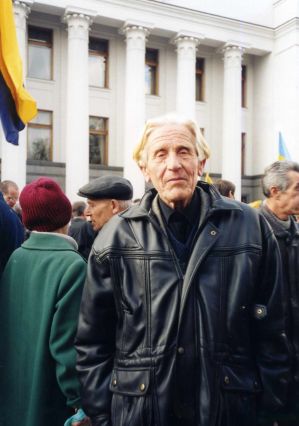(born August 14, 1926, in the village of Hlushkiv, Horodenka raion, Ivano-Frankivsk oblast)
Participant in the national liberation movement of the 1940s–1980s.
A peasant’s son, Hutsul went into the underground with his brothers Vasyl and Roman upon the return of the Bolsheviks in 1944 and underwent military training. In a battle near Sniatyn on May 10, 1944, he was one of 12 soldiers captured. The investigation was conducted in the Sniatyn and later the Stanislav prisons, at night, and involved beatings. On October 4, 1944, within an hour, the Military Tribunal of the Fourth Ukrainian Front delivered its verdict: two were sentenced to penal servitude, and ten to death, including the minor M. Hutsul. On death row, he learned that his sentence had been commuted to ten years of imprisonment, and while in the Far East—between Sovetskaya Gavan and Komsomolsk-on-Amur—he discovered it had been changed in absentia to 20 years of penal servitude.
In 1947, he was transported to Norilsk. In the katorga camp No. 3 of Gorlag, he participated in a strike that began on June 4, 1953, after several prisoners were shot from the watchtowers. The strike lasted two months. The strike committee, consisting of 11 representatives of different nationalities, hoisted black mourning flags and demanded a relaxation of the regime, better working conditions, the removal of numbers from clothing, and the removal of locks from the barracks.
Through breaches made by soldiers in the fences, only a few of the 3,500 prisoners came out. The camp was taken by force, resulting in the deaths of about one hundred and fifty prisoners, mostly Ukrainians, who were the majority of the contingent. The zone was disbanded. H. worked in a mine and a coal pit.
In 1955, H. was released by a decree of the Presidium of the Supreme Soviet dated April 24.
On his way back to Ukraine, he visited his exiled mother, Maria, and learned that his brother Roman had died in the underground in 1950.
In 1956, H. married Iryna Lutchyn (died January 17, 2000) in the village of Hlushkiv. They worked at a sugar factory in Horodenka and raised two daughters (Maria, b. 1957, and Hanna, b. 1958) and a son (b. 1961).
Meanwhile, H. became close with a circle of human rights defenders, obtaining and sharing with others Ukrainian literature from earlier periods and samizdat works by V. Moroz and other dissidents.
On March 24, 1974, H. was arrested along with Mykola Hamula and Roman Haiduk in Case No. 92, from which the case of Oksana POPOVYCH was separated on June 17. She was arrested on October 2, the day after she returned from the hospital on crutches.
During a search of H.'s home, only the “Decalogue”—“The Ten Commandments of a Ukrainian Nationalist,” “The Twelve Traits of a Ukrainian Nationalist,” “The Prayer of a Ukrainian Nationalist”—and a book by V. Vynnychenko were seized, but there was testimony that he had distributed samizdat.
In August 1974, he was sentenced by the Ivano-Frankivsk Regional Court under Article 62, Part 1 of the Criminal Code of the UkrSSR (“Anti-Soviet agitation and propaganda”) to 6 years in strict-regime labor camps and 3 years of exile. He served his term in camp ZhKh-385/19 (Mordovia, settlement of Lesnoy), and from the autumn of 1979, in ZhKh-385/3 (Barashevo).
On March 20, 1980, he was transported to exile in the settlement of Kargasok, Tomsk oblast. He worked as a stoker.
Upon his return in 1983, H. was not granted a residence permit for his wife's home or anywhere in the Western regions of Ukraine. They had to move to the village of Novooleksandrivka, Kashtanskyi raion, Mykolaiv oblast. He worked on a collective farm, as a stoker, on a farm, and at a refrigerator plant. He returned to Horodenka with his wife in 1990.
He was a participant in pickets for the legalization of the Greek Catholic Church, an activist in the All-Ukrainian Society of Political Prisoners and the Repressed, and a member of the Congress of Ukrainian Nationalists.
In 1992, he was rehabilitated in both cases. He lives in the city of Horodenka, Ivano-Frankivsk oblast.
Bibliography:
KHPG Archives: Interview with M. Hutsul, April 17, 2001. https://museum.khpg.org/1195852804
Mizhnarodnyi biohrafichnyi slovnyk dysydentiv krain Tsentralnoi ta Skhidnoi Yevropy i kolyshnoho SRSR (International Biographical Dictionary of Dissidents in Central and Eastern Europe and the Former USSR). Vol. 1. Ukraine. Part 1. Kharkiv: Kharkiv Human Rights Protection Group; “Prava Liudyny,” 2006. Pp. 199–200. https://museum.khpg.org/1121096453
Rukh oporu v Ukraini: 1960 – 1990. Entsyklopedychnyi dovidnyk (The Resistance Movement in Ukraine: 1960 – 1990. An Encyclopedic Guide). Preface by Osyp Zinkevych, Oles Obertas. Kyiv: Smoloskyp, 2010. P. 186; 2nd ed.: 2012, Pp. 203–204.
Vasyl Ovsienko, Kharkiv Human Rights Protection Group. June 24, 2005. Last read on August 6, 2016.
